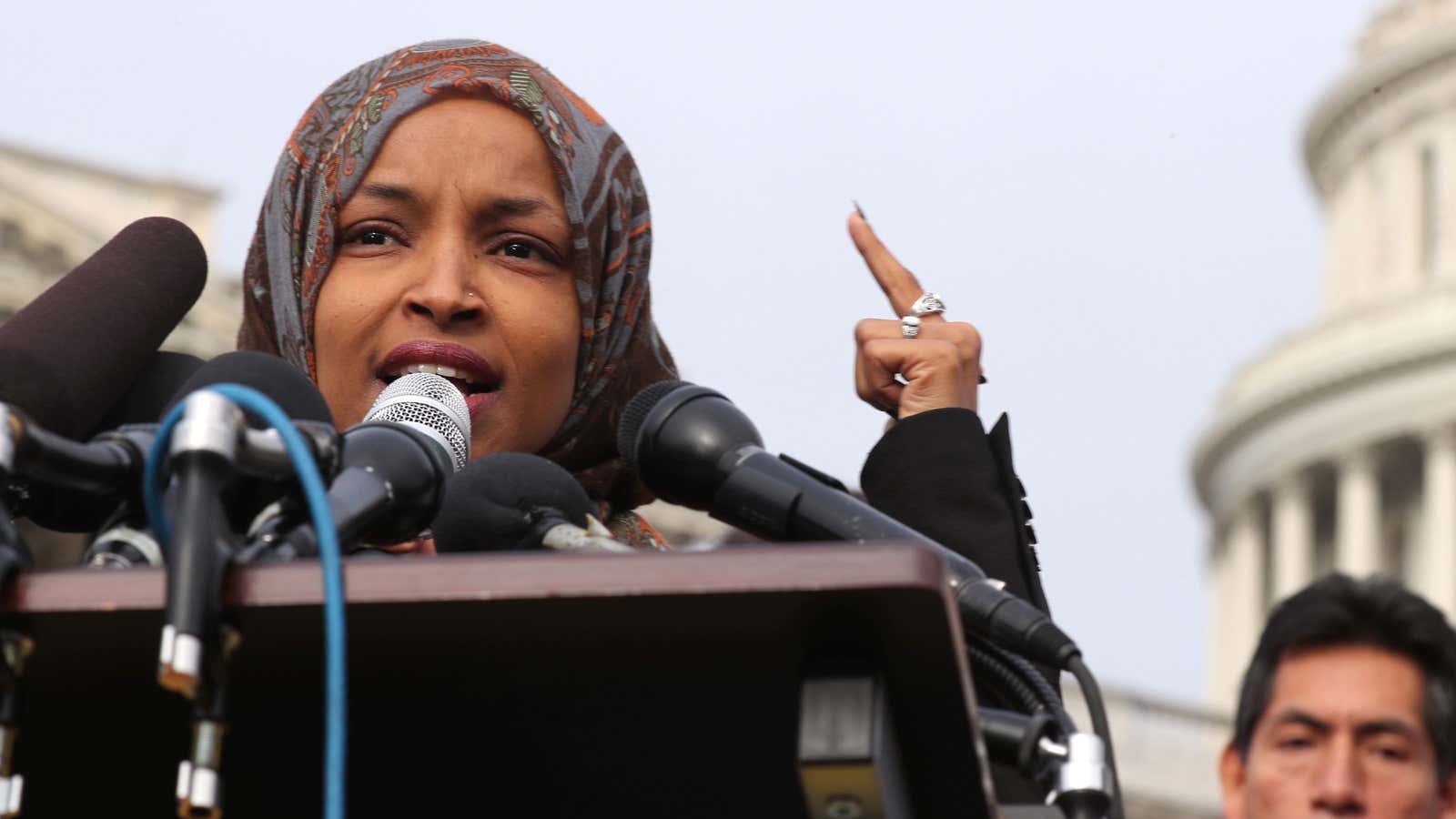Republicans and Democrats criticized Ilhan Omar, the Democratic congresswoman from Minnesota, after she tweeted that Republican support for Israel is linked to cash, particularly from the powerful pro-Israel group AIPAC.
Jerry Nadler, the New York Democrat who chairs the House Judiciary Committee, called Omar’s remarks “deeply disappointing and disturbing” and said she “appears to traffic in old anti-Semitic tropes about Jews and money.” Speaker of the House Nancy Pelosi said Omar’s “use of anti-Semitic tropes and prejudicial accusations about Israel’s supporters is deeply offensive.’
At the same time, some Americans rushed to Omar’s defense. “Lobbies influence politics, I don’t think that’s controversial to say,” said Rebecca Vilkomerson, executive director of Jewish Voice for Peace. “It’s not anti-Semitic to accurately describe something that is completely obvious about the Israeli lobby,” tweeted Brandon Friedman, a former Obama official who heads a public-relations agency whose clients address national security and defense issues.
In apologizing today (Feb. 11), Omar stood by her view that lobbyists’ money in general plays too big of a role in American politics.
Pro-Israel funding has increased
Pro-Israel groups like AIPAC—the American Israel Public Affairs Committee—have been pouring money into US politics over the past 20 years and their influence in Washington has been scrutinized for nearly as long. However, the amount AIPAC has donated has been dwarfed in recent years by the mega-donors Sheldon and Miriam Adelson.
The Center for Responsive Politics calls the overall pro-Israel politics lobby one of the most “active and well-financed” groups related to international issues in America: “It’s a highly fractious issue with high stakes and it plays a big role in domestic politics.”
Amid concerns that former president Barack Obama would be less supportive of Israel, donations by pro-Israel political-action committees jumped in 2008, his first year in office.
In 2018, these groups (including AIPAC) spent about $5 million on direct lobbying efforts beyond campaign contributions; pro-Saudi groups, for a rough contrast, spent $19 million from the beginning of 2017 until October 2018.
Over the past two federal election cycles, pro-Israel groups have given more to Democrats than Republicans:
The pro-Israel groups represent a spectrum of political positions, though they are united against the ”boycott, divestment, and sanction” campaign started in 2005 to protest Israeli policies toward the Palestinians. (A bill moving through Congress would allow state governments to dump contractors that boycott Israel.)
One of the top pro-Israel DC lobbying groups in recent years has been JStreetPAC, which is dedicated to “a diplomacy-first approach to advancing US interests in the Middle East and promoting peace and security for Israel,” including a “two-state approach” for Israel and Palestine, and continued foreign aid to both.
“There is no doubt that money often plays a major role in our political system,” J Street said in a statement released today about Omar’s comments. “At the same time, elected officials must be extremely aware that tropes about Jewish money and political influence have been used for centuries to target and stigmatize our community.”
AIPAC’s political contributions
The powerful lobbying group that Omar referenced has been active in the US since the 1960s, foots the bill for dozens of Congress trips to Israel every year, and was a longtime opponent of the Iran nuclear deal the Obama administration crafted. Along with other groups representing Middle East interests, AIPAC has applauded Trump’s withdrawal from the deal and the reimposition of sanctions on Iran.
AIPAC’s political support is seen as so important that every top 2016 US presidential candidate spoke at the group’s annual convention, from Hillary Clinton to Ted Cruz.
Bernie Sanders, the only Jewish candidate in the 2016 race, appeared by video. In a rare move for a US elected official, he offered some criticism of the Israeli government’s policies in his speech, saying, “When we talk about Israel and Palestinian areas, it is important to understand that today there is a whole lot of suffering among Palestinians and that cannot be ignored.” Peace, he said, would require compromise from “both sides.”
The Adelsons and Israeli American Council
AIPAC’s lobbying and campaign contributions have been much less than the huge influx of cash into US politics from mega-donors Sheldon Adelson and his wife, Miriam, who was born in Israel to parents who had emigrated to British-controlled Palestine from Poland in 1930s.
They were the largest donors in the 2018 midterm elections with $123 million, all of that to Republican political action committees that then funneled millions to incumbents in tough races. Adelson-controlled entities gave $55 million to the Congressional Leadership Fund, for example, which spent $126 million running ads against Democrats such as Wisconsin’s Randy”IronStache” Bryche.
The Adelsons also fund the Israeli American Council (IAC), a group with 20 chapters around the US that Sheldon Adelson described as a hardline alternative to AIPAC in November 2017. IAC will “unequivocally always without question and irreversibly support Israel when it needed it,” he said. “There will be no political correctness. There will be no questions about whether we should keep the door to the White House open to us.”
Miriam, a doctor who runs drug-treatment clinics in Las Vegas and Israel, is believed to be a key influence on Trump’s decision to move the US embassy in Israel to Jerusalem, a move that most American Jews didn’t support. “Injecting Israeli Jewish sensibilities into the American Jewish body politic is what drives a lot of what the Adelsons fund,” the Times of Israel wrote last year. Sheldon’s casino interests have been advanced by the Trump administration, including lobbying the Japanese government on his behalf for a casino license.
Miriam described how her childhood shaped her views in an interview with Hadassah Magazine in 2014. “I don’t remember any children of my class who were from Europe and had grandparents,” she said. “All were lost in the Holocaust. There was nobody to spoil us. We grew up knowing our existence depended on a strong army and that everyone around us wanted to invade us. It was important just to survive.”
